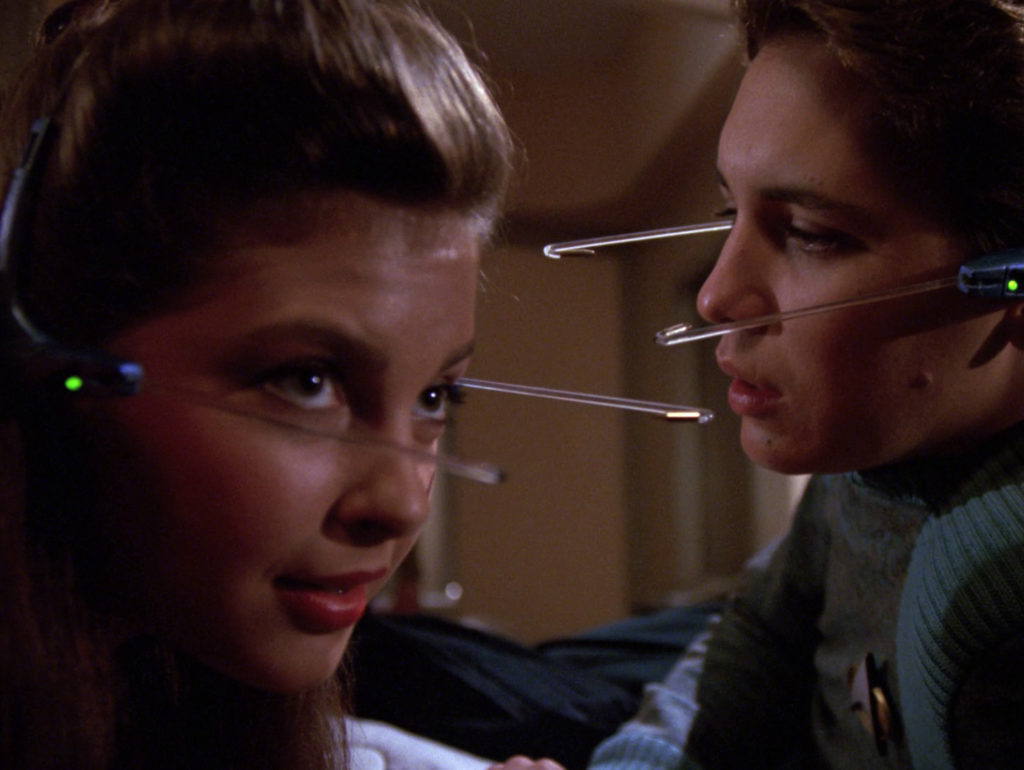



Through our interactions with digital devices and systems us humans are now a diverse resource to other humans and machines. And we are changing in accordance with the processes and demands of contemporary, technological market systems, designed to extract as much data from us as possible. In his recent article Our minds can be hijacked, Paul Lewis of the Guardian revealed that those in the know, those who helped to create Google, Twitter and Facebook, are now disconnecting themselves from the Internet as, like millions of people in the world, they are feeling the effects of addiction to social networking platforms, and fear its wider consequences to society.
The hazards of this kind of tech-contagion have been the staple food of sci-fi for decades – a mysterious woman shares a strange but simple VR game in the 1991 episode of Next Generation Star Trek, The Game. It spreads like wildfire, taken up with enthusiasm by the crew, only later revealed to be a brainwashing tool invented by an alien captain to seize control of first the ship, and then all of Starfleet. Let’s look at ourselves for a moment – if we can tear our gaze away from our screens. How has our public behaviour changed – on the streets, on public transport, in buildings and parks? Our attention transfixed by our devices, online via our phones and tablets – bumping into each other, and even walking into the road endangering their own and others’ lives.

Professor of psychology Jean M. Twenge studies post-millennials and argues that a whole younger generation in the US, would rather stay in doors than going out and partying. Even though they are generally safer from material harm they are on the brink of a mass mental-health crisis. She says this dramatic shift in social behavior emerged at exactly the moment when the proportion of Americans who owned a smartphone surpassed 50 percent. Twenge has termed those born between 1995 and 2012, as generation iGen. With no memory of a time before the Internet, they grew up constantly using smartphones and having Instagram accounts. In her article Have Smartphones Destroyed a Generation? Twenge writes “Rates of teen depression and suicide have skyrocketed since 2011. It’s not an exaggeration to describe iGen as being on the brink of the worst mental-health crisis in decades. Much of this deterioration can be traced to their phones.”
Internet addiction is like having your head perpetually inside a magical mirror of hypnotically disembodying power #addictsnow pic.twitter.com/DFkl1jaKER
— furtherfield (@furtherfield) August 31, 2017
From the #addictsnow Twitter commission by Charlotte Webb and Conor Rigby, 2017
We offer three features as part of Furtherfield’s 2017 Autumn editorial theme of digital addiction, in parallel with the exhibition Are We All Addicts Now? at the Furtherfield Gallery, until 12th November 2017. Artist Katriona Beales has developed the exhibition and events programme in collaboration with artist-curator Fiona MacDonald: Feral Practice, clinical psychiatrist Dr Henrietta Bowden-Jones, and curator Vanessa Bartlett. She explores the seductive qualities, and the effects of our everyday digital experiences. Beales suggests that in succumbing to on-line behavioural norms we emerge as ‘perfect capitalist subjects’ informing new designs, driving endless circulation, and the monetisation of our every swipe, click and tap.
Firstly we present this interview with Katriona Beales* from the new book Digital Dependence (eds Vanessa Bartlett and Henrietta Bowden-Jones, 2017) in which she discusses her work and her research into the psychology of variable reward, “one of the most powerful tools that companies use to hook users… levels of dopamine surge when the brain is expecting a reward. Introducing variability multiplies the effect” and creates a frenzied hunting state of being.
Pioneer of networked performance art, Annie Abrahams, creates ‘situations’ on the Internet that “reveal messy and sloppy sides of human behaviour” in order to awaken us to the reality of our networked condition. In this interview, Abrahams reflects on the limits and potentials of art and human agency in the context of increased global automation.
Finally a delicious prose-poem-hex from artist and poet Francesca da Rimini (aka doll yoko, GashGirl, liquid_nation, Fury) who traces a timeline of network seduction, imaginative production and addictive spaces from early Muds and Moos.
“once upon a time . . .
or . . .
in the beginning . . .
the islands in the net were fewer, but people and platforms enough
for telepathy far-sight spooky entanglement
seduction of, and over, command line interfaces
it felt lawless
and moreish
“
And a final recommendation – The Glass Room, curated by Tactical Tech
Tactical Tech are in London until November 12 with The Glass Room, exhibition and events programme. A fake Apple Store at 69-71 Charing Cross Road, operates as a Trojan horse for radical art about the politics of data and offers an insight into the many ways in which we are seduced into surrendering our data. “At the Data Detox Bar, our trained Ingeniuses are on hand to reveal the intimate details of your current ‘data bloat’; who capitalises on it; and the simple steps to a lighter data count.”
*This interview is published with permission from the publishers of the book Digital Dependence edited by Vanessa Bartlett and Henrietta Bowden-Jones, available to purchase from the LUP website here.